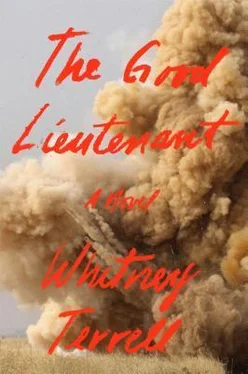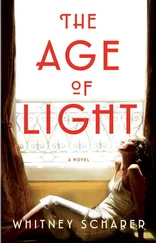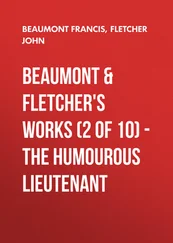Fifteen minutes later, after some rewardingly aggressive driving— Beep! Left on East Chestnut Street. Beep! — the phrase Turn right into the Cracker Barrel parking lot ended the CD. She parked and climbed out, feeling skeptical as hell. A light dusting of flakes blazed in headlight glare as other cars swung through the lot. Crawford and Waldorf and Dykstra — she’d felt like they’d pretty much been on board with her from the beginning. (Though who could tell, really, especially since her little war with Masterson had earned them an extra twenty-four-hour shift on the DRIF?) But Beale? Beale was a wild card. Beale was exactly the sort of person who might sit around laughing the next day about how Family Values Fowler wound up eating at the Cracker Barrel by herself.
Still, she went in. Of course, the Cracker Barrel didn’t have a bar, which sucked. And they didn’t generally have TVs for watching the game. Instead, it was filled with old farming signs, rakes nailed up to the wall — none of which she would’ve noticed or felt embarrassed about had Beale not started in with the Family Values thing. The waitress who came up in her brown apron and white blouse was familiar, though: Susie Wrightman, a girl she’d known back in high school, a couple of years behind her.
“Emma,” she said. “You guys getting ready to deploy yet?”
“Few more weeks,” she said. “How’d you guess?”
They reached a table, Fowler seating herself while Susie Wrightman laid out silverware for her, then politely slipped a menu into her hands.
Fowler glanced up at Susie Wrightman, a face that she’d once seen every day for years, pretty, bottle-blond, ex-cheerleader, now getting heavy in the cheeks. On her good days, she still felt a small flare of pride (coupled, in certain ways, with disbelief) that she had listened to their high school recruiter, Captain Morris, rather than ending up carrying around plates for $6.50 an hour plus tips. But on a night like tonight, the uniform felt like a disguise. She wasn’t any more qualified to command a platoon in Iraq than Susie Wrightman was. The difference was that Susie Wrightman wasn’t arrogant enough to pretend she could. “People talk,” Susie said, shrugging, with a funny expression on her face. “You hear things in a job like this. Plus you look a little stressed.”
“Do I?” Fowler said. She smiled uneasily, stripped her cap off, set it on the table, and ran her fingers over her hair. There was still something odd about Susie’s expression, a secret she was holding back. “Yeah, well, I got some personal problems I got to deal with.”
“Like him?” Wrightman nodded toward the back of the restaurant.
Fowler leaned around the corner of her booth and saw Carl Beale grinning at her from an empty table, then swiveled around and laid her head back against the booth’s backrest, slumping. “You don’t serve beer, do you?” she asked.
“That bad, huh?” Susie Wrightman said, laughing.
“Shit, I don’t know.”
“Yeah, well, I’ll tell you one thing,” Wrightman said. She knelt down briefly, still with that odd expression on her face. “He’s been tipping extra-heavy,” she whispered. “So don’t bust his ass too badly, okay?”
Fowler nodded, overcome by the certainty that Beale was, in fact, the absolute last person she wanted to see. And she had no one but herself to blame. He tottered over, grinning, eased his heavy belly in behind the table across from her.
“You mind if I sit?”
“Nope,” she said.
“You expecting anybody?” he asked.
Fowler tried to remember the advice that Pulowski had given her on Beale. Be personal. Don’t stand on ceremony. Let him see that you’re a human being. Let him know that you can get hurt. Start with posture, Pulowski had said, and don’t think about your brother. Beale isn’t your brother. She tried to smile, but it felt off-key.
“Look, Beale,” she said. “Let’s not sit here and rehash this whole thing with Masterson, okay? You think he’s a great commander, that’s fine by me. I just don’t like being put in a situation where I have to steal federal property. From members of the military. Which I am in .”
“I don’t know. Seems kind of Old Testament to me.”
“We’re not in the Old Testament, Beale. We’re in the Army. I don’t know about you, but I like the Army.”
“You do?” Beale made a shocked face, his pliable features hunching together in an impression of deep incomprehension. He was leaning forward now across the table. Sloppy. Pushing in on her. She made an effort not to back away. “What’re you doing here, anyway?” he asked slyly. “I would’ve thought that you’d be up there at the colonel’s tonight, smoking cigars with Captain Happy.” He nodded at her cell phone, which she’d set on the table. “You still waiting on a call?”
She pocketed the phone. Stared back at Beale openly but without the smile. “There’s not going to be a call,” she said. “Captain seems to think I’m not party material. Or maybe officer material at all.”
Beale nodded. “Yeah, well, you’re better off with family.”
“You’re not my family, Beale.”
“Really?”
“No,” she said. “The Army isn’t family, okay, Beale? It’s a job. And this platoon is not going to work if you keep treating it differently. Just because I’m a woman doesn’t mean I’m going to clean up your messes for you. Or show up the next time you leave me a lame mix CD.”
“No?”
“No. And if I can’t rely on you to follow my orders when I give them, if I can’t rely on you to stay inside the rules once we get out there”—she waved her hand at the front window of the Cracker Barrel, the snow swirling in the parking lot lights, as if that were Iraq—“then I can’t have you on my team!”
Beale, however, appeared undeterred. To her surprise, he didn’t stiffen up or flush, as he usually did when she corrected him.
“So you’re saying you’re not my family,” he said.
“Do I stutter?”
“Does that mean Dykstra’s not family?”
“Oh, come on, Beale.”
This was the moment, she figured, that Pulowski had been warning her about. The mad moment. The moment when you had that very bad feeling that everything you’ve been trying to escape by joining the Army is exactly the fucking thing that’s waiting for you there. “Beale, I’m going to order,” she said. “I had a shitty day.”
“Does that mean Waldorf’s not family?”
“I’m going to have the chicken-fried steak. You want anything?”
“Crawford? I mean, he’s going to be very, very sad when he hears that.”
“You know what those guys are?” Fowler said. “You know why Crawford’s never going to hear a thing like that, Beale? Because he’s got his shit together. Because he’s not the kind of soldier who comes down to the Cracker Barrel to ride his lieutenant’s ass.”
“You’re going to have to admit it eventually,” Beale said. He took the menu from her and pretended to examine it, while gazing at her over its top edge.
“Admit what?”
Beale smiled, tossed the menu back down on the table, stared at a spot just beside her ear, broad and childish, with his secretive-kid’s face.
“That you saved our fucking asses. Took the hit for us. I wouldn’t have thought that Family Values had it in her—”
“I hate that name, Beale. It’s not family values that I’m talking about here. Half the guys in the Army are here because their daddy disappeared. Did your family have good rules, Beale? ’Cause mine didn’t. You think I want to run my platoon like that? You think I enjoy lying to my CO? We stole Army property, Beale. We busted into trunks stenciled with another company’s call letters. I want something better than that.”
Читать дальше












